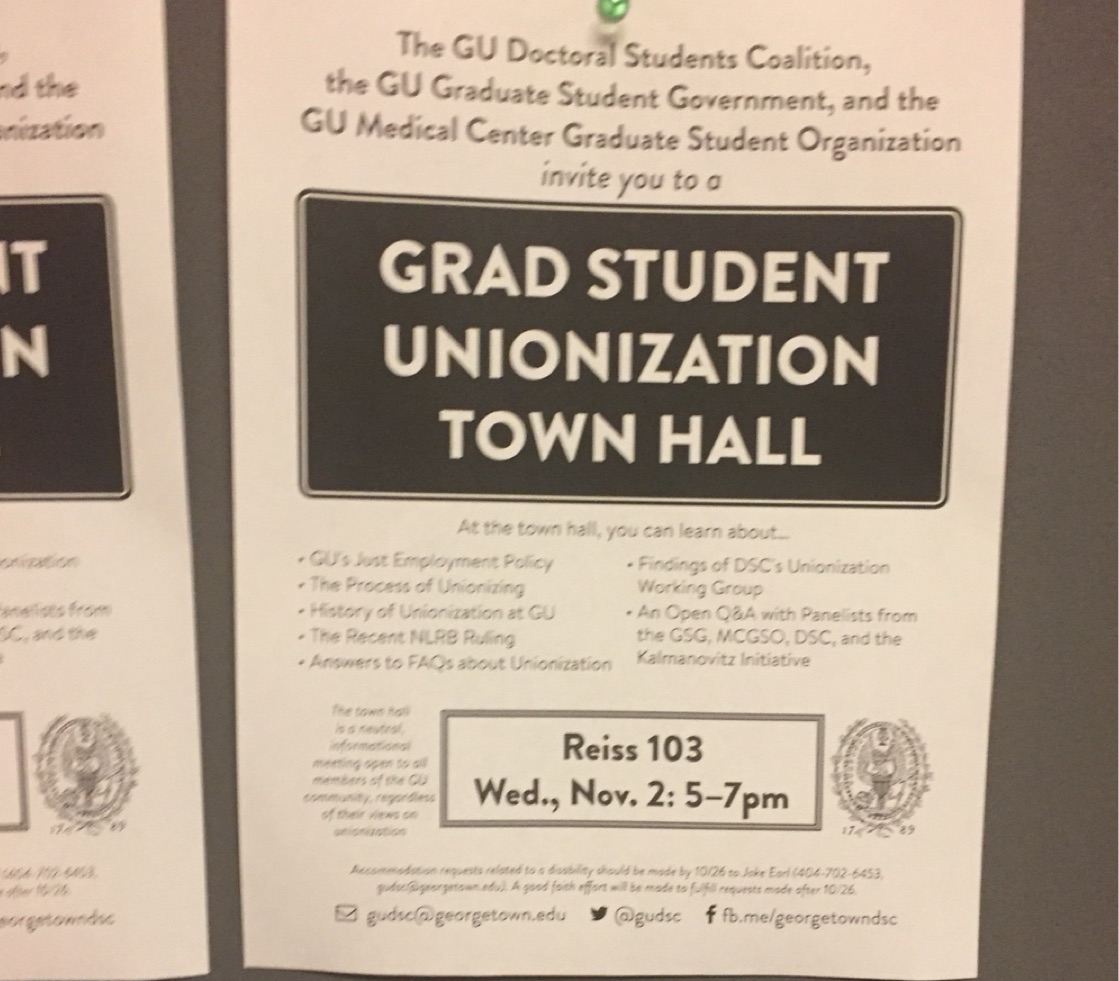Georgetown’s graduate students held a town hall on Nov. 2 for teaching assistants to discuss the possibility of unionizing in response to an Aug. 23 ruling from the National Labor Relations Board (NLRB) in favor of graduate student unionization at private universities.
During the town hall, members of the Doctoral Students’ Coalition (DSC) presented the findings from their unionization working group. In anticipation of the NLRB ruling last August, the 15 member unionization working group read union contracts of other unionized students, became familiarized with Just Employment Policy, and spoke with the Service Employees International Union (SEIU), American Federation of Teachers, and unionized graduate students from other universities.
Before the NLRB decision there were 34 graduate students unions in the U.S., mostly at public university systems. Ben Feldman, a Ph.D student in the history department and the vice president of the DSC, noted the positive effect unionization had on pay at these universities.
“We still haven’t found an example of an affiliation that didn’t result in some pay increase, including some sort of cost of living adjustment,” he said. All unions that the group looked at offered at least a cost of living adjustment and a yearly raise larger than the union’s dues. The largest pay increase the group found was a 38 percent increase in year one.
Deirdre Nelms, a Ph.D candidate in the philosophy department, said that unionization is a five-step process that begins with forming an organizing committee. After this step the process continues with affiliating with an international union, filing for an election, and bargaining a contract. The working group recommended affiliation with the American Federation of Teachers, conditional upon sufficient interest from the student body.
Feldman explained that the group sent out a survey on unionization to all doctoral students. “Should we find that there is sufficient interest, the next step would be to invite representatives of unions to come onto campus and begin a campaign,” Feldman said. “A campaign would be the start of a process that would lead to a vote.”
Feldman commented on how unionizing would affect the number of hours that graduate students could work. “A union contract can limit the hours you can be compelled to work in the lab or as a TA. They cannot limit the hours that you choose to work,” Feldman said. “No contract that will be signed will insist that you voluntarily curtail the research that you are doing to advance your career.”
Erum Hadid, a Ph.D candidate in the government department and an international student, said she does not expect unionization to negatively impact international students. “The examples that I’ve been reading up on have made me realize how much this process has done for international students,” Hadid said. She added that unions at other universities have provided international students with tax and immigration assistance.
Nick Wertsch (COL ‘09 LAW ‘18), program coordinator for the Kalmanowitz Initiative for Labor and the Working Poor on campus, said because of Georgetown’s Just Employment Policy, employees of the university are guaranteed the right to unionize and the right to a living wage. “Georgetown has a policy that guarantees a living wage to all workers on campus. That living wage rate right now is $16.45 an hour. And it also protects the right to organize a union,” said Wertsch. “The Just Employment Policy applies to everyone working on campus, direct employee or not.”
Facilities workers, adjunct professors, contracted janitors, and Leo’s employees have all successfully organized into separate unions. Wertsch believes that the university administration has not fought the unionization of employees and has instead remained neutral on the subject since the introduction of the Just Employment Policy in 2005.
If unionization does occur, the different groups of students will have to make their own decisions about whether to be part of the bargaining agreement. For example, master’s and medical center student assistants will not necessarily be included if only doctoral students choose to unionize. Furthermore, if doctoral students choose to unionize, they will not be able to leave the union individually or refuse to pay for services given.
Alex Plum, a master’s candidate and the president of Graduate Student Government, highlighted a lack of representation for graduate students at Georgetown. “We still don’t receive equal recognition in the university’s highest decision-making bodies, such as the Board of Directors, where our undergraduate counterparts currently represent the entirety of Georgetown Student body’s collective voice,” he said. Plum said he believes that discussions like this one are very important to the future of all students at the university. “This dialogue is pertinent not only to the Ph.Ds among us, but the institution as a whole,” he said.





